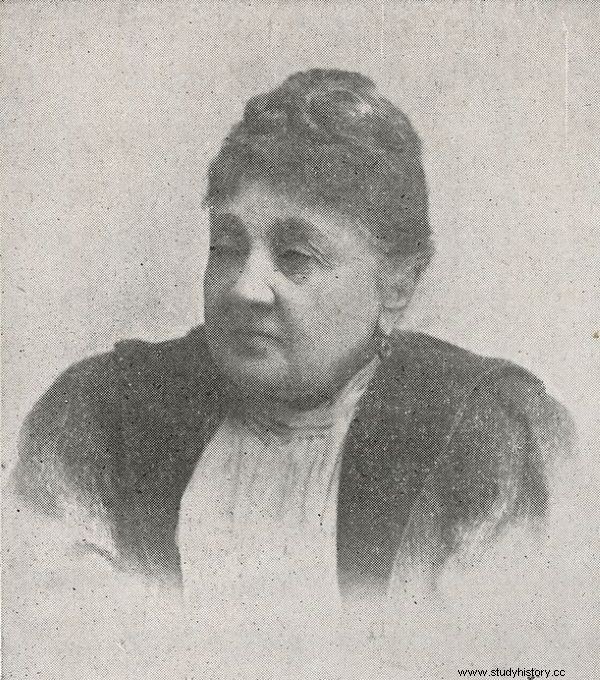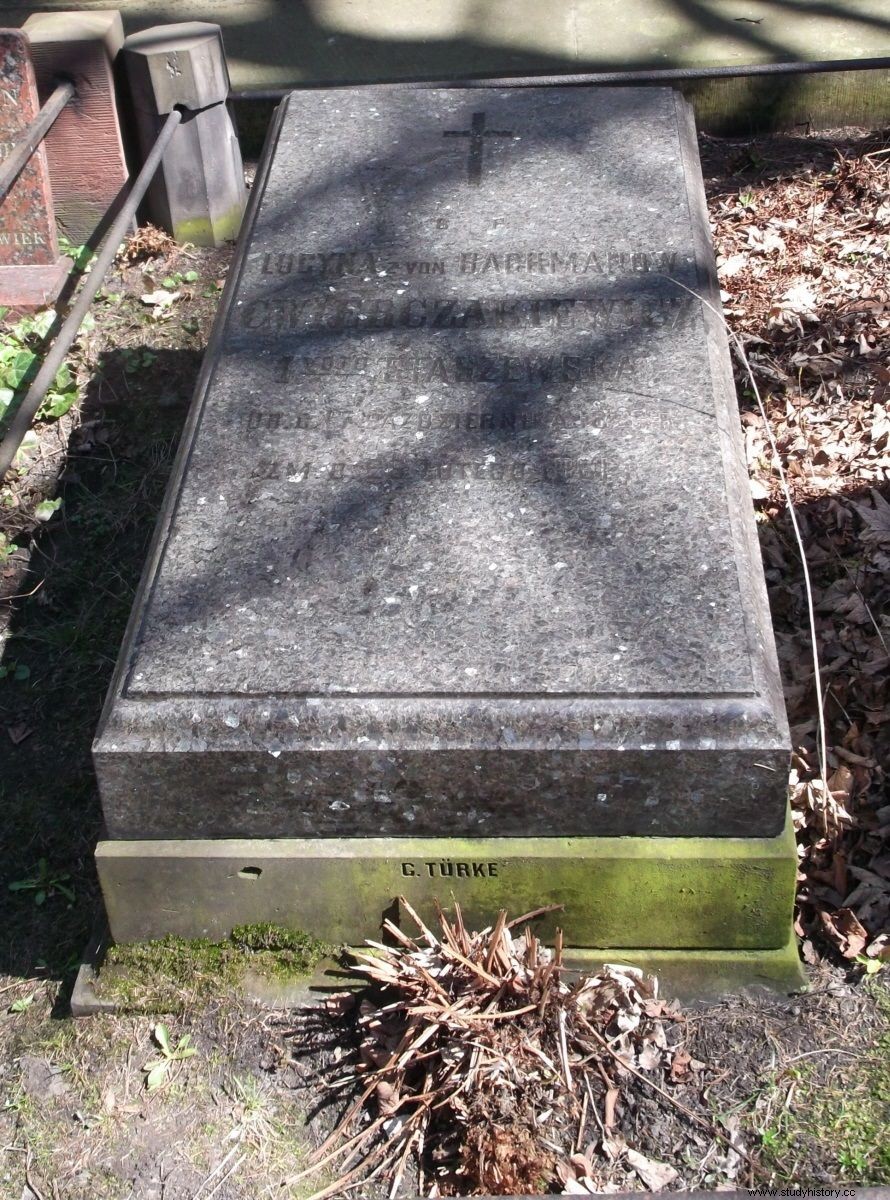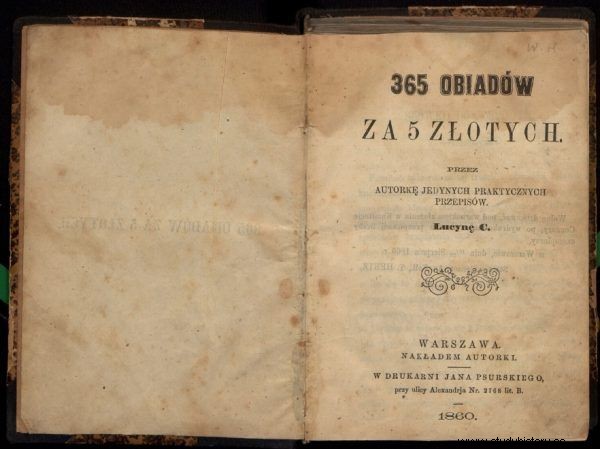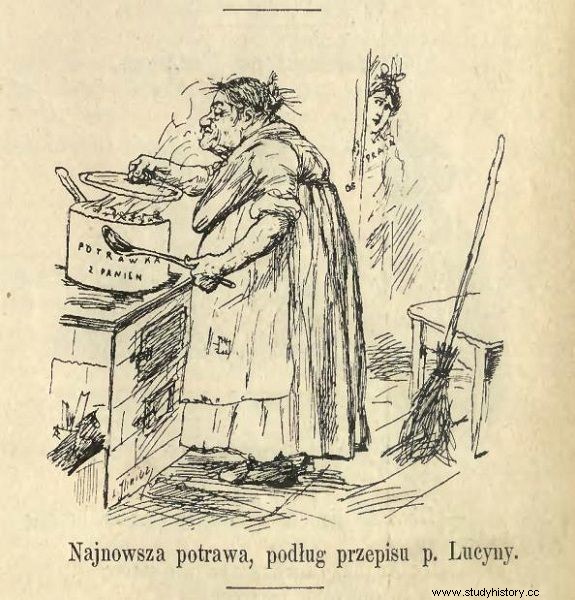There was no television or radio then, and the ladies did not even have to eat out on their own. It was not easy to achieve fame and the status of a best-selling writer. However, Lucyna Ćwierczakiewiczowa managed to become a real star, ahead of even such authors as Prus or Sienkiewicz by several lengths!
There is no indication that Lucyna von Bachman - born in 1829 in Warsaw - will make any kind of career. Youth is ordinary. Like many other girls like her, she receives a thorough home education. Its essence is not to teach history, geography or mathematics to young girls. Instead, the girls learn to converse in French, sing opera arias, and take painting or drawing lessons.
As Marta Stockholm writes in her book "Pani od dinów" Lucyna's mother: gives her a lot of freedom, does not despotically impose her taste or way of life, but requires that, like her brother, she speaks German in the evenings on even days, and in French on odd days. However, he does not invest in her, but in Karol [older brother - ed. AZJ].
The boy is expected to work and earn a living in the future. Lucyna must be able to manage a household well. The latter is - in the mother's eyes - even more important than the knowledge of languages and the rules of courtesy.
Forced by her mother to cook
Initially, Lucyna does not want to take care of the house at all. Her mother makes her interested in the kitchen. And this is extremely effective.
When a candidate for the girl's hand appears on the horizon, Franciszek Staszewski, a minor at that time Lucyna is able to charm him and his family with a sumptuous dinner. Interestingly, the bride-to-be takes part in discussions regarding property arrangements that usually take place before the wedding. After getting married, the couple goes to the estate near Pułtusk, and Lucyna begins an independent career as a housekeeper.

Lucyna Ćwierczakiewiczowa in her youth was not one of the perfect beauties for whom a garland of men is chasing. As she advanced in the years, her passion for food became apparent and the cook began to gain more and more weight until she began to have problems with moving. Photo published in 1901 (photo:public domain)
Her innate thirst for knowledge makes itself felt very quickly. She immediately becomes interested in everything that grows on her farm. Court gardens full of vegetables, orchards with juicy fruit, fresh meat from her own farm and access to venison give her a wide range of possibilities. Young Mrs. Staszewska closely observes the lives of her neighbors and begins to carefully note down what she witnesses. He sees meticulously kept spending notebooks, detailed instructions issued for the ministry and proven methods passed on from generation to generation.
In the economic field, Lucy is doing very well, but her marriage is crumbling.
My husband spends less and less time at home, constantly traveling to Warsaw on "business". Staszewska becomes pregnant, which gives her hope for a moment to rebuild her relationship. Unfortunately, he loses the child and all illusions. A series of constant quarrels pushes her to decide to divorce, which was not easy at this time.
Mr. Prus, please review my book, and here's the wine
She is twenty-two when she ends a failed marriage. It takes her a long time to regain her balance, but she goes out to people again and meets Stanisław Ćwierczakiewicz, a stable official from the passport office. This time they fit perfectly. In it, Lucyna will find a reliable partner for life, whom she will care for and who will be a real anchor for her.
The spouses live in Lucyna's family home, where the increasingly aging mother gradually places the reign of power in her hands. Meanwhile, Ćwierczakiewiczowa is flourishing. He attends lectures, invites interesting people and is gaining more and more experience in the culinary field. In society, it is already famous for its delicious liqueurs, preserves and marinades, and guests, when invited to her home, immediately start to enjoy the delicious meal that awaits them.
Finally, Ćwierczakiewiczowa makes a decision:she will publish her recipes and advice in the form of a book! For the first outlay, he borrows money from a friend and fears for a long time whether he will be left with a great debt. It is 1858, when the shelves of bookstores find "The only practical recipes for preserves, various marinades, cold meats, spirits, liqueurs, fruit wines, honey and cakes".
A long title does not deter readers. Contrary to the fears of the future star, the circulation is spreading quickly, and she not only returns the debt to her friend, but manages to earn all the trouble. A completely new perspective opens up for an almost thirty-year-old woman. However, Lucyna does not rest on her laurels. In his apartment, he prepares a work corner for himself and sits down to prepare his next publications.

The tomb of Lucyna Ćwierczakiewiczowa (photo:Tarabosh, license CC BY-SA 3.0)
Ćwierczakiewiczowa's recipes and tips introduce a completely new quality to Polish cuisine. The author is inspired by regulations - domestic and foreign - but she develops them in an innovative way. Most of all, it prefers light dishes that do not drown in excess fat and thick sauces.
In his farm advice, he emphasizes that as important as the dish is the way it is served. He also tells women that dinner doesn't have to be expensive and sophisticated to be tasty.
In 1860 he publishes "365 lunches for 5 zlotys by the author of the only practical recipes, Lucyna C.". This book changes her life forever. And it brings her real fame.
Soon Lucyna is on everyone's lips. He publishes successive publications on which he begins to earn better and better money. Its circulation is equal to the most read writers of the epoch, which Bolesław Prus ironically comments in his column, stating: What Mickiewicz did not dream of with us was Mrs. Ćwierczakiewicz .
In turn, the playwright Marian Gawalewicz writes that the information about the circulation of "365 dinners" literally depressed him and humiliated , because even in his wildest dreams he could not dream of similar numbers.

The title page of the first edition of "365 lunches" by Ćwierczakiewiczowa.
Lucyna surpasses even the famous author of adventure novels, Henryk Sienkiewicz, in terms of reading interest.
She also appears in Warsaw salons, although everyone is afraid of her sharp tongue and small (or quite considerable) spitefulness.
A tongue like a whip
When she visits her friends and notices a layer of dust somewhere, she can leave an autograph in it with her finger and ask the hostess if she has found her "business card". Nevertheless, he is doing brilliantly in terms of marketing. She is a true pioneer in pampering journalists. When he sends more books for review, he adds food from his pantry to them. Among others, Bolesław Prus is delighted with them.
His commentary on "Christmas Carols for Housewives" by Ćwierczakiewiczowa is quoted by Marta Stockholm in the book "Pani od dinów" :
Someone said that for the sacrament of marriage you need the following qualifications:being of legal age, free and free will and ... "365 lunches for five zlotys." Well, just as Ćwierczakiewiczowa's dinners are an integral part of a marriage and an indispensable mental seasoning of the honeymoon months, as long as this era is compatible with the mind, the "Calendars" of the mentioned author are a necessary component of our Christmas literature. Snow, fasting, and wafers do not yet prove the imminence of Christmas. It is only when "A Christmas Carol for the Housewives" is published that you can feel Christmas Eve in the air.

A caricature of Ćwierczakiewiczowa that appeared in the satirical magazine "Mucha" in 1899, when the press began to cross the cook for a text about bridesmaids (photo:public domain)
Like King Stanisław August Poniatowski, Lucyna Ćwierczakiewiczowa in her apartment in Warsaw begins to organize Thursday dinners. It is visited by artists, writers, journalists - all those who count among the Warsaw social cream. One of the regulars at these parties - quoted in the work "Lucyna Ćwierczakiewiczowa" by Jerzy Franke - recalls:
Every week there were invitations like orders for friends, and often strangers, calling for a spoonful of broth, for tea with surprises, for the famous guts or dancing evenings. And the whole world visited Mrs. Lucyna, fearing to offend her by refusal.
It is an open secret that the offended Ćwierczakiewiczowa can scold more brutally with her tongue than with a rod. The "companion girls", whose entire procession has been running through her household for years, are convinced of this. In 1899, in his "Calendar" he placed the text "Silhouettes of my bridesmaids", which the Warsaw press in unison describes it as a lampoon. Although the cook does not name the girls using their full names, she does not shy away from giving details that allow people who know them to guess their identity without fail.
He writes about some of them that they are thieves, others that they are dirty, and still others that they are simply stupid. For these words, she meets Ćwierczakiewiczowa with a real lynch. She is attacked so fiercely that she withdraws from public life, ceasing to publish books. He still only maintains an advice corner in one of the ladies' magazines. He dies on February 26, 1901.
Information sources:
- Franke J., Lucyna Ćwierciakiewiczowa , Polish Press History Quarterly 31/1 (1992).
- Machowska M., "There is only Shakespeare and one Ćwierczakiewicz." An attempt to present Lucyna Ćwierczakiewiczowa in a new light , "Vade Nobiscum", T. X (2013).
- Stockfisz M., The dinner lady , Wydawnictwo Literackie 2018.
